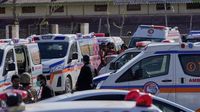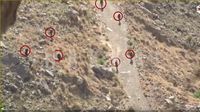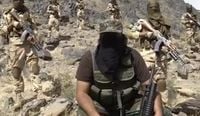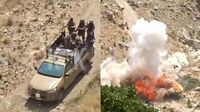The Baloch Liberation Army (BLA) has intensified its campaign against the Pakistani military, claiming responsibility for two deadly attacks that resulted in the deaths of 14 soldiers in the Balochistan province. The incidents, occurring in Bolan and Kech, have raised alarms amid rising regional tensions following India's recent military operations.
In the first attack, the BLA's Special Tactical Operations Squad (STOS) executed a remote-controlled improvised explosive device (IED) strike on a military convoy in the Shorkand area of Mach, Bolan. This devastating explosion reportedly killed all 12 soldiers on board, including Special Operations Commander Tariq Imran and Subedar Umar Farooq. The vehicle was completely destroyed in the blast, signaling a significant tactical achievement for the insurgents.
Hours later, on May 7, 2025, the BLA targeted a Bomb Disposal Squad of the Pakistani Army in the Kulag Tigran area of Kech. The remote-controlled IED detonated around 2:40 PM while the unit was conducting a clearance mission, resulting in the deaths of two additional personnel. This coordinated assault highlights the BLA's capability to execute high-impact operations against military targets.
Jeeyand Baloch, spokesperson for the BLA, issued a defiant statement following the attacks. He criticized the Pakistani military, stating, "The hired killers who call the Baloch Liberation Army a foreign proxy should know that the Pakistani army itself is a mercenary armed gang that thrives on Chinese capital and Papa Jones." Baloch further declared that the BLA would continue its operations against what they perceive as a mercenary occupying force, emphasizing their commitment to the struggle for Baloch independence.
The recent attacks come in the wake of India's Operation Sindoor, which targeted terror infrastructure across the border. The BLA's actions are seen as a direct response to the heightened military activity in the region, reflecting the complex dynamics between India and Pakistan. Just days prior, India launched airstrikes on nine terror camps, escalating tensions in an already volatile area.
These incidents underscore the ongoing conflict in Balochistan, where separatist groups have long sought independence, alleging political exclusion, economic exploitation, and systemic human rights violations by the Pakistani state. Despite the region's wealth of natural resources, local communities argue that the profits are siphoned off by the central government and foreign interests, leaving them in poverty.
The heavy military presence in Balochistan is often viewed not as a protective measure but as an oppressive force, intensifying local resentment and fueling insurgency. The divide between Baloch nationalists and federal authorities continues to widen, creating instability in the region.
The attack in Bolan marks one of the deadliest incidents involving the BLA in recent months, demonstrating their capacity for orchestrating complex and lethal operations. The Pakistani military has yet to respond publicly to the claims of responsibility or confirm the casualties, although security forces have initiated search operations in the Mach Kund area following the blast.
As tensions rise, the situation in Balochistan remains precarious. The BLA's increased activity signals a potential escalation of violence, not only within Pakistan but also in the context of Indo-Pak relations. The international community is closely monitoring the developments, hoping for a resolution that avoids further conflict.
Analysts believe that the BLA's recent strikes may provoke a stronger military response from Pakistan, further complicating the security landscape in Balochistan. With both India and Pakistan on high alert, the risk of miscalculation or unintended escalation looms large.
The BLA's actions reflect deep-rooted grievances among the Baloch people, who feel marginalized and oppressed. The ongoing conflict is a stark reminder of the challenges facing the region, where calls for autonomy and self-determination continue to clash with national security interests.
In conclusion, the BLA's recent attacks illustrate the complex interplay of local insurgency and broader geopolitical tensions. As both sides prepare for potential retaliation or further military operations, the prospects for peace and stability in Balochistan appear increasingly uncertain.




